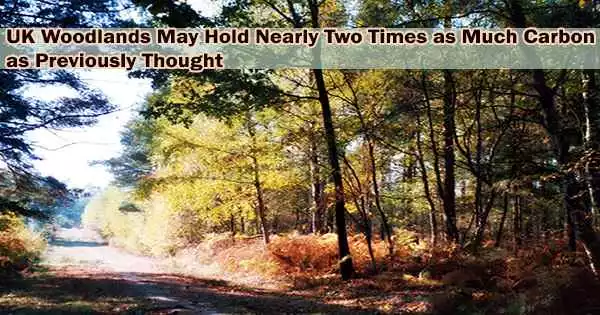According to a recent study by UCL researchers, UK woods may be able to store nearly twice as much carbon than earlier predictions indicate. This has implications for how we interpret carbon stocks and how people will react to climate change.
The multinational team of scientists utilized a cutting-edge 3D scanning technique and analysis to measure the amount of aboveground biomass (AGB) used to calculate carbon storage from 815 trees in a UK woodland for the study, which was published today in the journal Ecological Solutions and Evidence.
The team found that their results were 77% higher than previous estimates (410 t ha-1 of biomass vs 232 t ha-1).
The potential underestimating of forest carbon stores, according to the authors, might have both favorable and unfavorable effects on climate policy, with implications for how forests are used to combat climate change.
Study co-author Professor Mat Disney (UCL Geography and the National Centre for Earth Observation) said: “Forests currently act as a carbon sink in the UK. However, whilst our finding that the carbon storage capacity of typical UK woodland could be nearly double what we previously thought might seem like a purely positive outcome, in practice this means that for every ha of woodland lost, we’re potentially losing almost twice the carbon sink capacity we thought.”
“This has serious implications for our understanding of the benefits of protecting trees in terms of climate mitigation and deforestation and afforestation targets more broadly.”
The study was collaboration between researchers from UCL, UK’s National Centre for Earth Observation (NCEO), the Universities of Ghent, Oxford and Tampere, The National Physical Laboratory, and Sylvera.
To establish their findings, the team undertook 3D terrestrial laser scanning (TLS) analysis in a 1.4 ha section of Wytham Woods in Oxfordshire. TLS is a kind of remote sensing that uses millions of laser pulses to create 3D images of the environment and the forest’s tree structures.
They compared their results to those of earlier models after using statistical modeling to determine the mass and volume of the trees and, ultimately, the region’s potential to store carbon.
Currently, most estimates of forest carbon stocks are based on simple allometric models that assume that a tree’s size and mass increase at a steady rate. Our findings show that relying on these models is problematic, as they are not representative of UK forests. While the models work well for trees smaller than around 50 cm in diameter, which are fairly uniform in terms of their size and volume, this isn’t what we see for larger, heavier trees. These are far more complex when it comes to structure and they vary hugely across place and species.
Professor Kim Calders
The study, according to the authors, calls into doubt the accuracy of projections of UK forest carbon storage, particularly for the biggest and most carbon-dense trees, which are currently based on widely adopted models that infer tree mass from the diameter of the trunk. Previous studies most certainly grossly underestimated the biomass of trees in the UK.
Study lead author Professor Kim Calders (Ghent University) said: “Currently, most estimates of forest carbon stocks are based on simple allometric models that assume that a tree’s size and mass increase at a steady rate. Our findings show that relying on these models is problematic, as they are not representative of UK forests. While the models work well for trees smaller than around 50 cm in diameter, which are fairly uniform in terms of their size and volume, this isn’t what we see for larger, heavier trees. These are far more complex when it comes to structure and they vary hugely across place and species.”
“It’s vital that we’re able to reduce uncertainty in forest carbon estimates, given that land use, and forest protection and restoration in particular, constitute a quarter of countries’ current commitments to their Paris Agreement targets.”
These allometric models are being used by the UK to report biomass stock data to the UN’s Food and Agriculture Organization, which the authors claim has very likely led to considerable underreporting.
Study co-author Yadvinder Malhi (Oxford University) added: “Wytham Woods belongs to the University of Oxford and has witnessed over 70 years of detailed scientific research. This research shows how new approaches can yield surprises in even well-studied forests, with profound consequences for our understanding of forests and their role in tackling climate change that apply across the UK and beyond.”
















